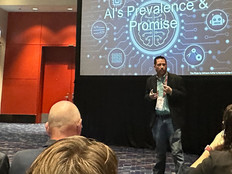MOOCs: The Next Social Networking Platform
Welcome to our weekly roundup of tech and education news. Have a story you’d like to see here? Tweet us.
Harvard Takes a New Approach to MOOCs
Massive open online courses (MOOCs) are essentially the wild west of higher education right now. A few colleges are looking for gold, but the majority are waiting to see how the latest disruption shakes down. Harvard has been at the forefront of MOOCs since cofounding edX in May 2012. This week, Harvard announced a new MOOC initiative, called HarvardX for Alumni, that will be available exclusively to alumni, according to The Harvard Crimson.
The new program, called “HarvardX for Alumni,” was announced this weekend at the University’s annual Alumni Leadership Conference. The program will draw from pre-existing HarvardX courses such as CB22x: “The Ancient Greek Hero” and MCB80x: “Fundamentals of Neuroscience,” while adding new features such as forums for local Harvard Clubs and Shared Interest Groups as well as live chats with faculty, according to Robert A. Lue, the faculty director of HarvardX.
“One thing I’ve heard time and time again is that alumni really miss the connection to the courses, the new coursework that is going on, the intellectual life of the university. The Harvard Alumni Association really does a good job of trying to keep those ties strong, but ultimately, it’s hard for alumni to connect with the courses,” Lue said. “The idea is to use [HarvardX] as a foundation to really create an online environment that will pull alumni back to Harvard so they can reconnect and continue to network with their peers.”
Courses that offer one-on-one time with an instructor could prove revolutionary for MOOCs but turning online education into a social platform could be even more exciting. Read the Chronicle's analysis here.
Google: 10 Gigabit Internet Is Coming
Google co-founder Larry Page lives to innovate. In a 2013 Wired article, Page said that Google aimed to deliver products and services that were 10 times better than the competition:
The way Page sees it, a 10 percent improvement means that you’re basically doing the same thing as everybody else. You probably won’t fail spectacularly, but you are guaranteed not to succeed wildly.
To that end, Google is undertaking a project to deliver 10 gigabit Internet speeds. Google Fiber, which has been rolled out in three cities as well as in a community near Stanford University, aims to deliver 1 gigabit speeds. For perspective, Delaware has the fastest statewide average Internet speed at just 10.88 megabits per second. One gigabit is 100 times faster, and 10 gigabits is 10,000 times faster.
That kind of speed would be unprecedented, but according to USA Today, Google wants to make this a reality within just a few years:
[Google Chief Financial Officer Patrick] Pichette called this the next generation of the Internet and said it was part of Google's broader, long-term obsession with speed.
Faster speeds will increase the use of software as a service because users will be able to trust that critical applications that are data intensive will run smoothly over the Internet, he explained.
"That's where the world is going. It's going to happen," Pichette said. It may happen over a decade, but "why wouldn't we make it available in three years? That's what we're working on. There's no need to wait," he added.
Video of the Week
With #snowchi covering much of the eastern coast, check out how the Durham Academy administrators let students know that classes were cancelled.
This Week on EdTech
- How IT Departments Can Partner with the Board of Trustees
- Alumni Pubs Go Digital, Mobile and Interactive
- Windows XP: For Colleges, It's Time to Move On
- Security in a Mobile World: 5 Tips to Safeguard Mobile Devices and Data
- Sony Xperia Tablet Z Is an Impressive Android Tablet
- Colleges Ride the Mobile Tidal Wave with Mobile Application Management Software
- 5 Tips for Data Deduplication in VDI
- Should Community College Be Free?
Have a story you think we should feature? Would you like to contribute to EdTech? Let us know.







